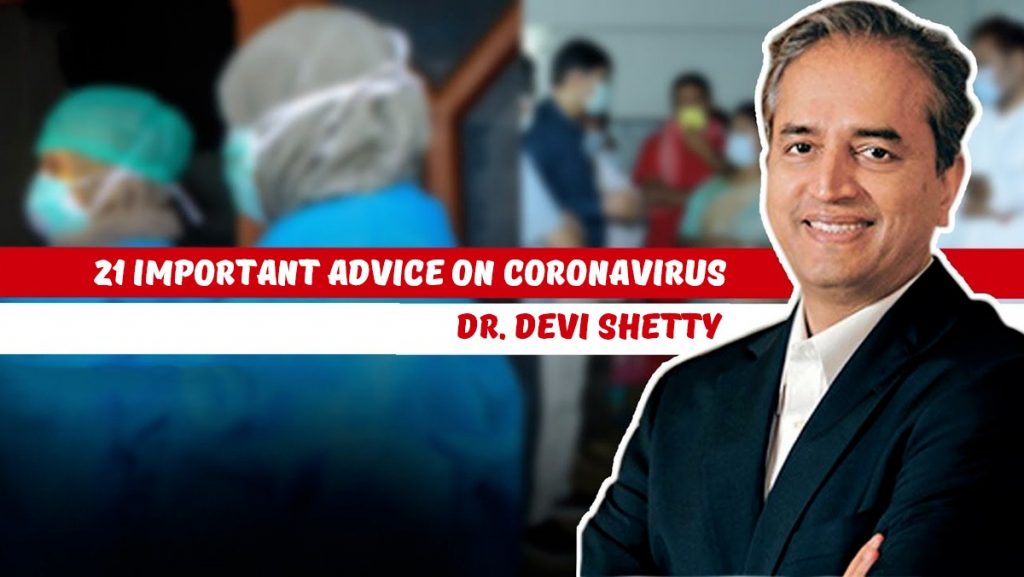Virendra Pandit
New Delhi: Apprehending that the second wave of Covid-19 pandemic may only become worse amid sped up vaccination program, and then the third wave could also strike, eminent cardiac surgeon Dr. Devi Prasad Shetty has said India will need an extra 500,000 ICU beds, 200,000 nurses, and 150,000 doctors in the next few weeks, and suggested radical solutions to meet the enormous challenge.
“Take the approach of drafting for the armed forces when there is an impending war with the enemy country … This is not peacetime. It is wartime.”
At present, India has between 75,000 and 90,000 ICU beds, almost all of which are already occupied, when the second wave is yet to peak, he said. India is reporting about 350,000 cases a day, and some experts say the number could go up to 500,000 cases daily at its peak.
“Now, we need to produce at least two lakh nurses and one-and-a-half lakh doctors in the next few weeks dedicated to managing the pandemic for the next one year. The current pandemic wave is likely to last for about 4 to 5 months. And then we should be prepared for the third wave,” he warned in his online address at the Symbiosis Golden Jubilee Lecture Series in Pune, according to media reports.
How to meet these enormous demands?
Dr. Shetty, Chairman, and Founder of Narayana Health, a chain of 23 medical centers across India, said India has about 2.20 lakh nursing students who have finished their three-year General Nursing and Midwifery (GNM) or four-year B.Sc. courses in various nursing schools and colleges across the country, and who are preparing for their examinations scheduled to take place in the next few weeks.
He suggested that the Union Ministry of Health, along with the Indian Nursing Council, should consider these students as graduates and deploy them to work in Covid-19 ICU wards for one year, after which they could be given graduation certificates, and a preference in government jobs.
“If that is done, I am convinced most of these girls and boys will join the fight against Covid-19. The battle cannot be won by doctors of my age. No war can be fought by people of my age. You need young people. Most of them are vaccinated and they are naturally in a better position to fight Covid-19 in case they get it.”
Also, he said there are 1.30 lakh young doctors today, working not in Covid-19 ICUs but preparing for NEET examinations to get into post-graduate courses where only 35,000 positions are available. An online test for NEET should be conducted immediately and results declared in a few days.
After filling the 35,000 seats, there will still remain one lakh young doctors who are left out, who didn’t get the PG seats. They should be offered a chance during the next year’s PG selection if they work in the Covid-19 ICU for one year, he said.
Additionally, there are about 25,000 doctors who have finished their postgraduate training and have not yet appeared for the exam. This batch of medical specialists can be given the option of skipping the exam and get the degree if they work in the Covid-19 ICUs for one year, he suggested.
Also, there are between 90,000 to one lakh doctors who graduated from overseas universities who have not been able to pass a national entrance exam. “Identify 20,000 brightest of these kids and ask them to work in Covid-19 ICU for one year and get a permanent registration,” he said.
Regretting the lack of medical infrastructure and personnel, he shared his concerns. “I am having sleepless nights for the next headline, which is going to be that patients are dying in ICUs because there are no nurses and doctors to take care of the patients,” he said.
“And this is going to happen. I do not doubt it now,” Dr. Shetty warned.
For every patient testing positive, there are 5 to 10 people who are positive but not tested. That means more than 15 to 20 lakh people are getting infected every day in India even now. Statistically, five percent of the positive patients need an ICU bed, irrespective of their age. On average, a patient in ICU spends at least 10 days there.
“So you can just imagine what the scenario is. Know what we need to do? We need to create at least five lakh additional ICU beds in the next few weeks,” he said.
“Unfortunately, beds do not treat patients. We need nurses, doctors, and paramedics in that order, he said, pointing out that managing Covid-19 patients successfully in ICUs depends mostly on nurses, not doctors.
Even before the start of the pandemic, government hospitals across the country had a shortage of 78 percent of medical specialists.
“If we can do this successfully in the next few weeks, believe me, we would have conquered the Covid-19 battle. Otherwise, the consequences can be very, very, very serious, mainly because just admitting a patient in a Covid-19 ICU and giving him some oxygen is not going to save their life.”
“Somebody has to monitor the patient’s oxygen level and blood gases. All this is done by nurses and junior doctors.”
“The current doctors and nurses who are taking care of Covid-19 patients across the country have done a fantastic job during the first wave. Now they are tired. They are fed up. They are burnt out. A number of them are getting infected.
“Unless we create a parallel workforce for Covid-19 ICUs, believe me, there can be a problem,” he said.
But he also acknowledged that his speculation about the number of Covid-19 patients and the estimate of ICU beds needed may go wrong.

